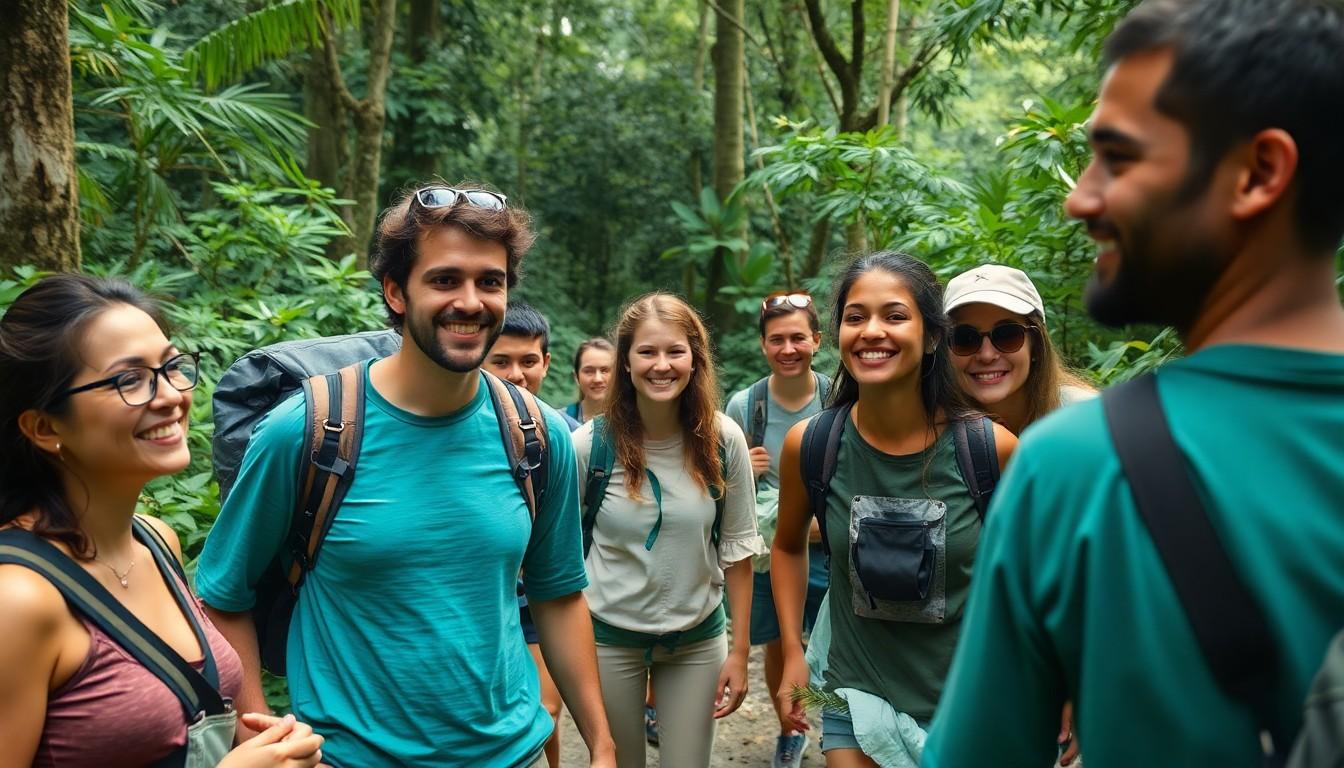In a world where Instagram feeds overflow with pristine beaches and exotic wildlife, responsible eco-tourism emerges as the superhero we never knew we needed. It’s not just about snapping selfies with elephants or sipping cocktails on a sun-kissed shore; it’s about ensuring those breathtaking landscapes stay breathtaking for generations to come. Who wouldn’t want to travel the globe while giving Mother Nature a high-five?
Responsible Eco Tourism
Responsible eco-tourism emphasizes sustainable travel that minimizes environmental impact and supports local communities. This approach to tourism promotes awareness of ecological issues and encourages travelers to engage with the environment respectfully.
Definition and Principles
Responsible eco-tourism involves travel that prioritizes conservation and community well-being. Key principles include minimizing resource consumption, supporting local economies, and enhancing environmental education. Environmental stewardship remains at the forefront, ensuring that natural habitats and wildlife are protected. Tourists are encouraged to partake in eco-friendly activities that foster a connection with nature while respecting cultural heritage. Sustainable practices, such as using renewable energy and reducing waste, characterize responsible tourism experiences.
Importance of Responsible Eco Tourism
Responsible eco-tourism plays a crucial role in sustaining environmental health and local cultures. It reduces the negative effects of traditional tourism while promoting conservation efforts. Responsible travelers contribute to the economy of host communities by choosing local businesses and services. Eco-tourism fosters awareness of environmental issues among tourists, inspiring them to advocate for sustainability. This form of tourism enhances visitor experiences through immersive learning opportunities while also preserving natural and cultural resources for future generations.
Benefits of Responsible Eco Tourism

Responsible eco-tourism offers numerous advantages that support both the environment and local communities. These benefits create a positive impact on travel experiences and promote sustainable practices.
Environmental Benefits
Responsible eco-tourism helps conserve natural habitats and protect biodiversity. Educated travelers often participate in wildlife protection initiatives, ensuring ecosystems remain intact. Additionally, reduced carbon footprints result from sustainable travel methods, such as hiking or using public transportation. Tourists engaging in eco-friendly activities foster awareness of conservation issues and support ventures aimed at minimizing environmental degradation. By prioritizing preservation efforts, responsible eco-tourism contributes to a healthier planet for future generations.
Socioeconomic Benefits
Local economies thrive when travelers support responsible eco-tourism. Tourists often patronize small businesses, creating jobs and boosting income for residents. Sustainable travel enhances community wellbeing, fostering a sense of pride in cultural heritage. When tourists engage with authentic local experiences, they deepen their understanding of customs and traditions. Moreover, funds generated from eco-tourism can finance education and conservation projects, empowering communities to preserve their natural and cultural resources. This reciprocal relationship enriches both visitors and hosts, promoting a vibrant exchange that benefits all parties involved.
Challenges Facing Responsible Eco Tourism
Responsible eco-tourism faces several challenges that hinder its potential benefits. Over-tourism presents significant issues for destinations striving for sustainability and conservation.
Over-Tourism
Over-tourism generates overcrowding in popular areas, leading to environmental degradation. Habitat destruction occurs when too many visitors flock to sensitive ecosystems. Additionally, local resources often become strained, negatively impacting communities. Many areas suffer from pollution as waste management systems struggle to cope with increased visitor numbers. Travel planners emphasize the need for limits on tourist capacities to preserve fragile environments. Initiatives such as timed entry or visitor quotas can help balance tourism with environmental preservation. Responsible travelers play a role by choosing less frequented destinations and visiting during off-peak times.
Cultural Sensitivity
Cultural sensitivity remains a crucial aspect of responsible eco-tourism. Visitors sometimes overlook local customs, leading to misunderstandings and potential harm to cultural heritage. Disrespect can arise from tourists engaging without understanding traditions or practices. Educated travelers contribute positively when they approach local cultures with respect and curiosity. Incorporating cultural awareness into travel planning enhances the experience for both tourists and locals. Guides often recommend engaging in community-led projects or participating in local events, fostering authentic connections. By prioritizing cultural sensitivity, travelers help preserve heritage and support the social fabric of host communities.
Best Practices for Responsible Eco Tourism
Responsible eco-tourism emphasizes sustainable practices that protect nature and local cultures. Focusing on eco-friendly options and active community engagement enhances both travel experiences and environmental preservation.
Sustainable Travel Options
Travelers prioritize eco-friendly transportation methods, like biking or using public transit. Choosing accommodations committed to sustainability supports environmentally conscious businesses. Many eco-lodges implement green practices such as solar energy or water conservation systems. Engaging in low-impact recreational activities, like hiking, minimizes disruption to wildlife. It often benefits travelers too; these experiences foster deeper connections with nature. Tourists can also offset their carbon footprints through tree-planting initiatives or carbon credits. Responsible travelers seek out experiences that allow them to appreciate the beauty of destinations while preserving their integrity.
Community Involvement
Engaging with local communities enriches the travel experience and supports economic growth. Tourists benefit from participating in cultural events and workshops led by local artisans. These interactions promote the preservation of cultural heritage and create sustainable livelihoods for residents. Many travelers opt to support local businesses by purchasing handmade goods or enjoying authentic cuisine. Collaborating with community projects, like conservation efforts or educational programs, fosters a sense of responsibility among visitors. By volunteering time or resources, they contribute to positive change and empowerment within the communities they visit. Active community involvement amplifies the impact of eco-tourism, ensuring mutual benefits for visitors and hosts alike.
Eco-Friendly Practices
Responsible eco-tourism is more than just a travel trend; it’s a commitment to preserving the planet and uplifting local communities. By choosing eco-friendly practices and engaging with local cultures, travelers can create a positive impact that resonates beyond their visit.
This mindful approach not only enhances personal experiences but also fosters a sustainable relationship between tourists and host communities. As awareness grows, so does the potential for eco-tourism to drive meaningful change. Embracing responsible eco-tourism ensures that future generations can enjoy the beauty of nature and the richness of diverse cultures.

